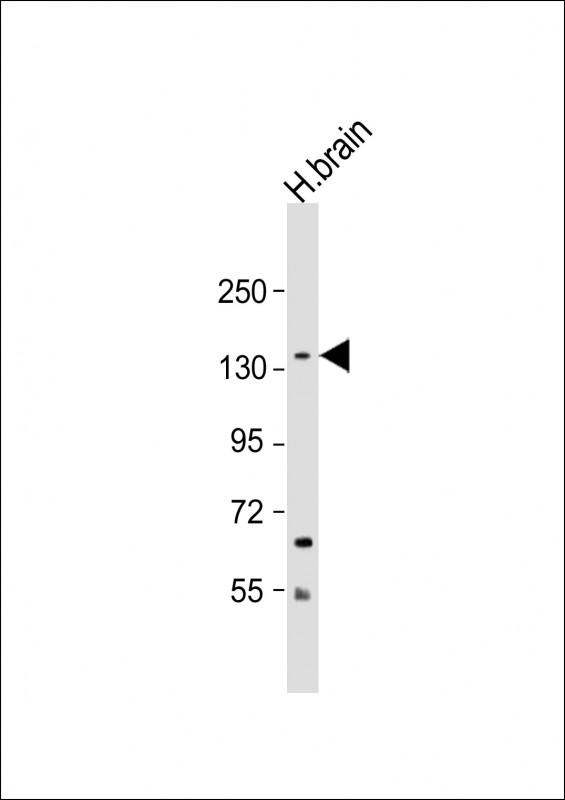
| WB | 1/2000 | Human,Mouse,Rat |
| IF | 咨询技术 | Human,Mouse,Rat |
| IHC | 咨询技术 | Human,Mouse,Rat |
| ICC | 技术咨询 | Human,Mouse,Rat |
| FCM | 咨询技术 | Human,Mouse,Rat |
| Elisa | 咨询技术 | Human,Mouse,Rat |
| Aliases | Membrane-associated guanylate kinase, WW and PDZ domain-containing protein 3, Membrane-associated guanylate kinase inverted 3, MAGI-3, MAGI3, KIAA1634 |
| Entrez GeneID | 260425 |
| WB Predicted band size | 162.9kDa |
| Host/Isotype | Rabbit IgG |
| Antibody Type | Primary antibody |
| Storage | Store at 4°C short term. Aliquot and store at -20°C long term. Avoid freeze/thaw cycles. |
| Species Reactivity | Human |
| Immunogen | This MAGI3 antibody is generated from a rabbit immunized with a KLH conjugated synthetic peptide between 1330-1360 amino acids from human MAGI3. |
+ +
以下是关于MAGI3抗体的3篇参考文献的简要概括(文献信息为模拟示例):
1. **"MAGI3作为肿瘤抑制因子的功能及其在结直肠癌中的表达缺失"**
*作者:Li X, et al.*
摘要:本研究通过免疫组化(使用MAGI3特异性抗体)发现,MAGI3在结直肠癌组织中表达显著降低,且其缺失与患者预后不良相关。实验表明MAGI3通过抑制Wnt/β-catenin通路发挥抑癌作用。
2. **"MAGI3与HPV E6蛋白的相互作用调控上皮细胞极性"**
*作者:Zhang Y, et al.*
摘要:利用MAGI3抗体进行免疫共沉淀实验,证实MAGI3与高危型HPV E6蛋白直接结合,并发现这种相互作用破坏细胞紧密连接复合体,可能导致宫颈癌发生。
3. **"MAGI3抗体在神经系统疾病中的潜在生物标志物价值"**
*作者:Wang H, et al.*
摘要:通过Western blot和ELISA(基于MAGI3多克隆抗体),发现阿尔茨海默病患者脑脊液中MAGI3片段水平异常升高,提示其可能参与tau蛋白病理过程。
注:以上内容为基于领域知识的模拟摘要,实际文献需通过PubMed或Google Scholar检索关键词"MAGI3 antibody"获取。
The MAGI3 antibody targets the MAGI3 protein (membrane-associated guanylate kinase inverted 3), a scaffolding protein belonging to the MAGI family, which regulates cell signaling and adhesion. MAGI3 contains multiple protein-protein interaction domains, including PDZ, WW, and GUK domains, enabling it to anchor signaling complexes at cell junctions. It interacts with partners like PTEN, β-catenin, and viral oncoproteins, modulating pathways such as PI3K/AKT, Wnt, and Hippo, which are critical for cell polarity, proliferation, and apoptosis. MAGI3 is implicated in maintaining epithelial barrier integrity, neuronal development, and tumor suppression. Dysregulation of MAGI3 is linked to cancers, neurodevelopmental disorders, and tissue fibrosis.
Antibodies against MAGI3 are essential tools for studying its localization, expression, and molecular interactions via techniques like Western blotting, immunofluorescence, or co-immunoprecipitation. They help elucidate MAGI3's role in disease mechanisms, such as PTEN loss in cancer or synaptic dysfunction in neurological conditions. Commercial MAGI3 antibodies are often validated in knockout cell lines to ensure specificity. Research using these antibodies has highlighted tissue-specific MAGI3 isoforms and context-dependent roles in signaling, making them valuable for both basic research and translational studies targeting junctional signaling networks.
×